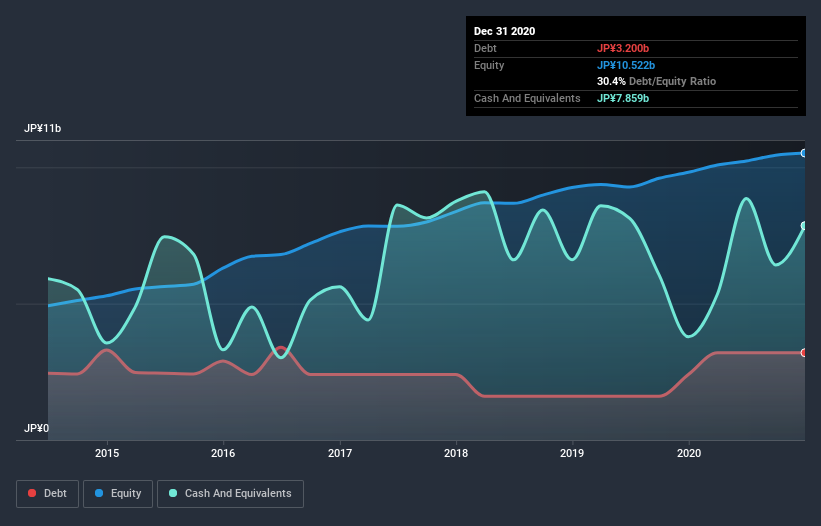
Howard Marks put it nicely when he said that, rather than worrying about share price volatility, 'The possibility of permanent loss is the risk I worry about... and every practical investor I know worries about.' So it seems the smart money knows that debt - which is usually involved in bankruptcies - is a very important factor, when you assess how risky a company is. Importantly, Moriya Corporation (TYO:1798) does carry debt. But the more important question is: how much risk is that debt creating?
When Is Debt A Problem?
Debt assists a business until the business has trouble paying it off, either with new capital or with free cash flow. Ultimately, if the company can't fulfill its legal obligations to repay debt, shareholders could walk away with nothing. While that is not too common, we often do see indebted companies permanently diluting shareholders because lenders force them to raise capital at a distressed price. Of course, debt can be an important tool in businesses, particularly capital heavy businesses. The first step when considering a company's debt levels is to consider its cash and debt together.
See our latest analysis for Moriya
How Much Debt Does Moriya Carry?
The image below, which you can click on for greater detail, shows that at December 2020 Moriya had debt of JP¥3.20b, up from JP¥2.40b in one year. But on the other hand it also has JP¥7.86b in cash, leading to a JP¥4.66b net cash position.

How Healthy Is Moriya's Balance Sheet?
The latest balance sheet data shows that Moriya had liabilities of JP¥15.0b due within a year, and liabilities of JP¥1.35b falling due after that. Offsetting these obligations, it had cash of JP¥7.86b as well as receivables valued at JP¥7.94b due within 12 months. So its liabilities outweigh the sum of its cash and (near-term) receivables by JP¥601.0m.
Since publicly traded Moriya shares are worth a total of JP¥4.54b, it seems unlikely that this level of liabilities would be a major threat. However, we do think it is worth keeping an eye on its balance sheet strength, as it may change over time. Despite its noteworthy liabilities, Moriya boasts net cash, so it's fair to say it does not have a heavy debt load!
The good news is that Moriya has increased its EBIT by 6.4% over twelve months, which should ease any concerns about debt repayment. There's no doubt that we learn most about debt from the balance sheet. But you can't view debt in total isolation; since Moriya will need earnings to service that debt. So if you're keen to discover more about its earnings, it might be worth checking out this graph of its long term earnings trend.
Finally, while the tax-man may adore accounting profits, lenders only accept cold hard cash. Moriya may have net cash on the balance sheet, but it is still interesting to look at how well the business converts its earnings before interest and tax (EBIT) to free cash flow, because that will influence both its need for, and its capacity to manage debt. During the last three years, Moriya burned a lot of cash. While that may be a result of expenditure for growth, it does make the debt far more risky.
Summing up
Although Moriya's balance sheet isn't particularly strong, due to the total liabilities, it is clearly positive to see that it has net cash of JP¥4.66b. On top of that, it increased its EBIT by 6.4% in the last twelve months. So we don't have any problem with Moriya's use of debt. When analysing debt levels, the balance sheet is the obvious place to start. However, not all investment risk resides within the balance sheet - far from it. For example Moriya has 2 warning signs (and 1 which makes us a bit uncomfortable) we think you should know about.
When all is said and done, sometimes its easier to focus on companies that don't even need debt. Readers can access a list of growth stocks with zero net debt 100% free, right now.
If you decide to trade Moriya, use the lowest-cost* platform that is rated #1 Overall by Barron’s, Interactive Brokers. Trade stocks, options, futures, forex, bonds and funds on 135 markets, all from a single integrated account. Promoted
New: Manage All Your Stock Portfolios in One Place
We've created the ultimate portfolio companion for stock investors, and it's free.
• Connect an unlimited number of Portfolios and see your total in one currency
• Be alerted to new Warning Signs or Risks via email or mobile
• Track the Fair Value of your stocks
This article by Simply Wall St is general in nature. It does not constitute a recommendation to buy or sell any stock, and does not take account of your objectives, or your financial situation. We aim to bring you long-term focused analysis driven by fundamental data. Note that our analysis may not factor in the latest price-sensitive company announcements or qualitative material. Simply Wall St has no position in any stocks mentioned.
*Interactive Brokers Rated Lowest Cost Broker by StockBrokers.com Annual Online Review 2020
Have feedback on this article? Concerned about the content? Get in touch with us directly. Alternatively, email editorial-team (at) simplywallst.com.
About TSE:1798
Flawless balance sheet established dividend payer.
Market Insights
Community Narratives



